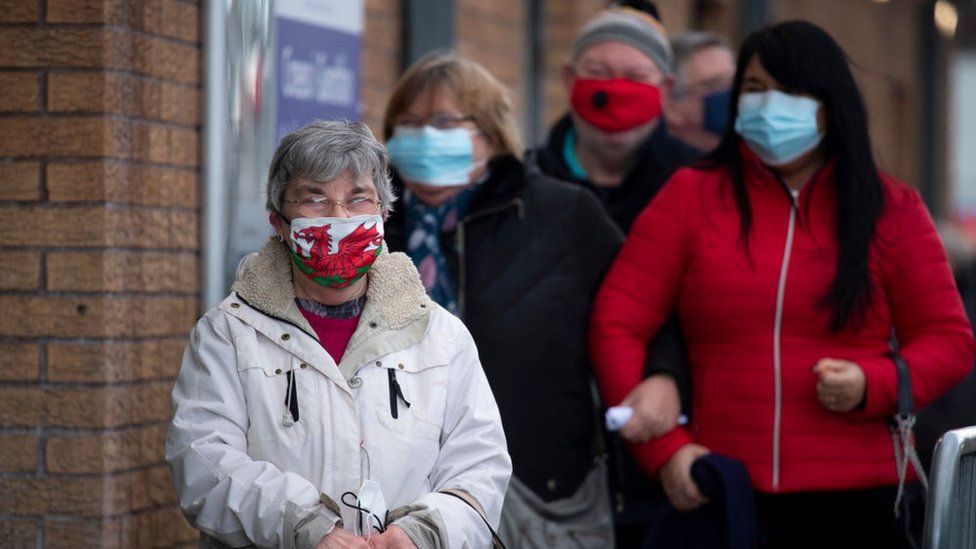
By David Deans, Rowenna Hoskin & Jack Grey
BBC News
The practice of locking down small areas during the autumn of 2020 was a “failed experiment”, Mark Drakeford has told the Covid inquiry.
Some council areas and towns like Llanelli and Bangor were subject to restrictions as officials struggled to cope with rising case numbers.
A senior Welsh advisor said that in hindsight “perhaps they weren’t the best idea”.
Rob Orford told the inquiry that lockdowns made it more “complicated”.
The chief scientific advisor for Wales was among the senior officials giving evidence at Monday’s hearing, sitting in Cardiff.
Meanwhile Sir Frank Atherton, chief medical officer for Wales, called the lack of information surrounding different UK restrictions an “omnishambles”.
Tom Poole, counsel to the inquiry, read the comment about local lockdowns from Mr Drakeford’s evidence as he quizzed Dr Rob Orford.
“I felt it made things more complicated that you had to have more legislation, more policies in place across different local authorities,” he said.
Image source, Welsh government
Wales’ chief medical officer Sir Frank Atherton
The hearing heard an account of the first Welsh government cabinet meeting where Covid was discussed in 24 February 2020 – a month after Sir Frank warned Mr Drakeford of a “significant risk” of Covid coming to Wales.
Minutes claimed that Vaughan Gething, who was health minister at the time, said there had been no imported cases in the UK at that point – there were nine positive cases by 18 February.
The minutes have been disputed by a Welsh government source, who told BBC Wales the document was incorrect in its account of Mr Gething’s remarks.
Russell George MS, Welsh Conservative shadow health minister, called the alleged mistake “astounding”.
“The fact that he wasn’t aware of Covid’s arrival into the UK when others were preparing is very telling.”
By the end of January, Sir Frank said it was “increasingly apparent that optimistic scenario of it fizzling out in China was not going to happen”.
He added that the delay did not particularly surprise him, because of “everything that was happening in Wales, including the management of the flooding“.
Sir Frank said no matter what the Welsh or UK governments had done, he believed a nationwide lockdown was unavoidable.
Face masks
During his evidence Sir Frank said Wales should have copied England when it made face coverings mandatory in public places.
Wales made masks compulsory on public transport in July 2020 but not in shops until September, whereas England made them mandatory in shops in July.
Sir Frank originally advised against it amid concerns over PPE, face coverings encouraging risky behaviour and coverings not being up to World Health Organization standards.
“I think from all the time and energy spent on face coverings it would have been better to align,” he added.
The inquiry was shown a page from Sir Frank’s notebook with the word omnishambles scrawled across it, which appears to be from the summer of 2020.
Image source, Covid Inquiry
Sir Frank had written omnishambles in his notebook about the difference in UK restrictions
“This represents a degree of frustration I think I had which is that information came from UK level into Wales very late and left us on the back foot on some issues,” said Sir Frank.
He said it “seemed odd” that some restrictions were being lifted when the virus was low, but other restrictions – including rules on wearing masks – were being introduced.
He concluded his evidence by saying there was “no safer alternative” to discharging hospital patients with symptoms of Covid into care homes without a test being required.
“The common view was that care homes ought to be able to manage cases of infectious disease by isolating people within there,” he said.
Though “not an easy decision” he said it was made “in the context of hospitals absolutely risking being overloaded”.
He said elderly patients could have been asymptomatic in hospital but potentially “staying in hospital and becoming infected”.
The Welsh government’s chief scientific adviser for health, Rob Orford, was concerned early in the pandemic that the disease would overwhelm the NHS.
Rob Orford, chief scientific adviser for health wrote emails in February explaining the NHS would be overwhelmed
The Inquiry heard he wrote two emails in February warning the NHS capacity would be outstripped based on the demand.
Public Health Wales advised against the Wales v Scotland Six Nations match of March 2020 taking place, despite the Welsh government not forcing its postponement.
By the time organisers called off the match, one day before kick-off, 20,000 Scottish rugby fans had already travelled to Cardiff.
Tom Poole, counsel to the inquiry, said Public Health Wales had advised the match “should be postponed or cancelled”.
Mr Orford said he was not aware that advice had been given but agreed that, with “the benefit of hindsight”, it would have made sense to call the match off.
Dame Shan Morgan, who was permanent secretary to the Welsh government for the bulk of the pandemic – the most senior civil servant in Wales, also gave evidence on Monday.
She admitted having deleted “some” early WhatsApp messages about Covid.
“I didn’t turn on disappearing messages… To be honest I wouldn’t know how to but I know I deleted a few early messages,” she said. “I have no recollection of why beyond I suppose just an attempt at housekeeping.”
Counsel to the Inquiry Tom Poole told the hearing that Jane Runeckles, the first minister’s special adviser, switched on the WhatsApp deletion function in November 2021.
The Inquiry will continue on Tuesday when Wales’ top civil servant Andrew Goodall and Public Health Wales boss Tracey Cooper will give evidence.








